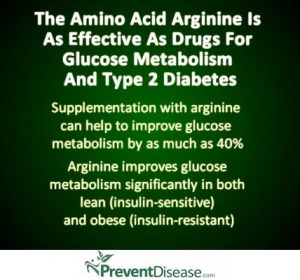Amino Acid Arginine Found As Effective As Drugs For Glucose Metabolism And Diabetes
Amino Acid Arginine Found As Effective As Drugs For Glucose Metabolism And Diabetes
This fascinating article posted on Prevent Disease.com refers to a study which may provide a new tool for dealing with those in the patient population that deal with glucose metabolism issues.
This study (in mice) indicates that supplementation with L-Arginine may dramatically improve glucose metabolism in cases of both insulin sensitive and insulin resistant metabolisms by upwards to 40 %.
L-Arginine is a relatively inexpensive amino acid and its utilization may prove to be a valuable addition to blood sugar / diabetic protocols as well as being relatively inexpensive from the patient’s perspective.
We would not suggest that simple supplementation with L-Arginine is an effective and comprehensive solution to resolving blood sugar / Diabesity Spectrum issues in a patient: when a patient presents with this kind of issue, many other factors and issues need to be taken into account.
Other issues that need to be addressed include:
- Hormones
- Sleep
- Inflammation
- Diet
- Stomach acidity / potential Hypochlorhydria
- Hydration
- Exercise
- Heavy metals
- POP’s (persistent organic pollutants)
- Infectious agents
- Excretory pathway functionality (liver, gall bladder, kidneys, GI tract etc.)
- Gut health
- Circulatory system
- Mitochondrial function
- And others
Berberine is an effective herbal compound which in published studies has proven to be equally efficacious to Metformin, one of the standard pharmaceuticals used for blood sugar/Diabetes issues.
Here is a link to a great article on this topic from the Life Enhancement website: of significance with regards to this differentiation between Berberine and Metformin are cardiovascular benefits provided by Berberine and not by Metformin as well as neuroprotective benefits (and increasingly the significance of insulin levels, mitochondrial function, inflammation and insulin resistance in the brain are being documented as key factors in neurodegenerative conditions to the extent that now Alzheimer’s is now being referred to as Type lll Diabetes in some published research)
Also Berberine activates AMPK (5′ AMP-activated protein kinase) which is an important consideration when addressing health issues with patients, given its widespread and significant impact on many metabolic pathways and functions.
We previously did a couple of newsletter articles on AMPK, which you can review here:
AMPK – Mitochondrial Biogenesis Visceral Fat Loss Anti-Aging Inflammation – and More.pdf
Here is the article on Arginine and glucose metabolism:
Supplementation with the amino acid arginine, commonly found in almonds and hazelnuts, could help to improve glucose metabolism by as much as 40%, according to new research in mice. The study shows that supplementation with the amino acid significantly improves glucose metabolism in both insulin-sensitive and insulin-resistant metabolisms.

More than 371 million people worldwide suffer from diabetes, of whom 90% are affected by lifestyle-related diabetes mellitus type 2 (type 2 diabetes). In new experiments, researchers from the University of Copenhagen working in collaboration with a research group at the University of Cincinnati, USA, have demonstrated that the amino acid arginine, found in salmon, eggs, and nuts, improves glucose metabolism significantly in both lean (insulin-sensitive) and obese (insulin-resistant) mice.
“In fact, the amino acid is just as effective as several well-established drugs for type 2 diabetics,” says postdoc Christoffer Clemmensen. He has conducted the new experiments based at Faculty of Health and Medical Sciences, University of Copenhagen.
He is currently conducting research at the Institute for Diabetes and Obesity at Helmholtz Zentrum Munchen, the German Research Centre for Environmental Health in Munich.
Even better than nuts are less energy-dense foods such as salmon and eggs, said Clemmensen.
Clemmensen said he expects similar results in human trials. “However, a key issue for future studies is to explore what doses of arginine can be tolerated by humans and to confirm that there are no adverse effects associated with arginine supplementation. It may be that the best strategy is to create a ‘dietary cocktail,’ including several nutrients all known to [aid] glucose metabolism.”
What researchers have found is that L-arginine potentiation of glucose-induced insulin secretion occurs independently of NO.
Italian researchers–specialists in diabetes, endocrinology, and metabolic diseases–knew that long-term arginine supplementation improves insulin sensitivity and endothelial function in type 2 diabetic patients who are not obese, because that had already been demonstrated.
Their own earlier study in 2001 showed that chronic administration of arginine improved insulin sensitivity in lean type 2 diabetic patients, but not in obese ones. Previously, German researchers had shown that arginine improved endothelial function to a similar extent as physical exercise did, and arginine together with exercise produced an additive effect.
“We have demonstrated that both lean and fat laboratory mice benefit considerably from arginine supplements. In fact, we improved glucose metabolism by as much as 40% in both groups. We can also see that arginine increases the body’s production of glucagon-like peptide-1 (GLP-1), an intestinal hormone which plays an important role in regulating appetite and glucose metabolism, and which is therefore used in numerous drugs for treating type 2 diabetes,” says Christoffer Clemmensen, and continues:
“You cannot, of course, cure diabetes by eating unlimited quantities of arginine-rich almonds and hazelnuts. However, our findings indicate that diet-based interventions with arginine-containing foods can have a positive effect on how the body processes the food we eat.”
The research findings were recently published in the American scientific journal Endocrinology under the heading Oral l-arginine Stimulates GLP-1 Secretion to Improve Glucose Tolerance in Male Mice.
Study Details
To test the effect of the amino acid arginine, researchers subjected lean and obese animal models to a so-called glucose tolerance test.
They found that arginine improves glucose metabolism significantly in both lean (insulin-sensitive) and obese (insulin-resistant) mice.
“We can also see that arginine increases the body’s production of glucagon-like peptide-1 (GLP-1), an intestinal hormone which plays an important role in regulating appetite and glucose metabolism, and which is therefore used in numerous drugs for treating type 2 diabetes,” said Clemmensen.
“Mice without GLP-1 receptors are not affected to the same extent by arginine,” he added. “There is no perceptible improvement in glucose metabolism or insulin secretion, confirming our hypothesis of a close biological connection between GLP-1 and arginine.”
“This exciting result has raised several new questions which we want to investigate. Can other amino acids do what arginine does?
Supplementation With Arginine
Supplemental dosages of 6 to 8 grams L-Arginine per day are considered safe. Although available in food, for some applications such as stimulating secretion of growth hormone from the pituitary, it is not released quickly enough as the food is digested. The supplemental doses taken on an empty stomach will arrive at the blood-brain barrier without competition. Then growth hormone secretion will be stimulated which in turn can affect glucose metabolism.
Sources:
news.ku.dk
life-choice.net
nih.gov
endojournals.org
Dave Mihalovic is a Naturopathic Doctor who specializes in vaccine research, cancer prevention and a natural approach to treatment.
Biotics has a number of products available which target blood sugar and diabetes conditions:
GlucoBalance with Carnitine (Gaby & Wright Formula) ACTIVATES AMPK
Berberine HCl (ACTIVATES AMPK)
L-Arginine
Aqueous Zinc
Lipoic Acid Plus
ADHS (Adrenal Support)
ADB5 – Plus (Adrenal Support)
Cytozyme – AD (Adrenal Glandular)
EFA Sirt Supreme
Optimal EFA’s
Cytozyme – PAN (Pancreatic Glandular)
Whey Protein Isolate
Regards,
Rob Lamberton

Robert Lamberton Consulting
Functional Medicine Consultant – Biotics Canada Products
Author of the Biotics Newsletter Articles
Certified Light/Darfield Microscopy Nutritionist
Formulator of Professional Nutraceutical Products
Contributing Writer / Advisory Board Member:
Nutricula: The Science of Longevity Journal
Healthy Organic Woman Magazine
Twitter: rob_lamberton Skype: larch60 Facebook: rlamberton
Email: rob@bioticscan.com
Phone: 778-227-4952
Copyright © 2015 R. V. Lamberton & Associates, All rights reserved